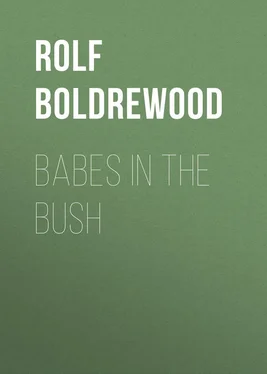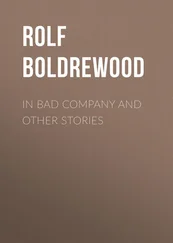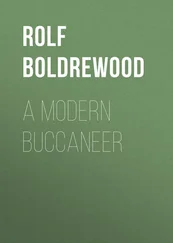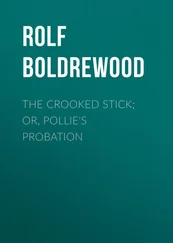Rolf Boldrewood - Babes in the Bush
Здесь есть возможность читать онлайн «Rolf Boldrewood - Babes in the Bush» — ознакомительный отрывок электронной книги совершенно бесплатно, а после прочтения отрывка купить полную версию. В некоторых случаях можно слушать аудио, скачать через торрент в формате fb2 и присутствует краткое содержание. Жанр: foreign_antique, foreign_prose, на английском языке. Описание произведения, (предисловие) а так же отзывы посетителей доступны на портале библиотеки ЛибКат.
- Название:Babes in the Bush
- Автор:
- Жанр:
- Год:неизвестен
- ISBN:нет данных
- Рейтинг книги:4 / 5. Голосов: 1
-
Избранное:Добавить в избранное
- Отзывы:
-
Ваша оценка:
- 80
- 1
- 2
- 3
- 4
- 5
Babes in the Bush: краткое содержание, описание и аннотация
Предлагаем к чтению аннотацию, описание, краткое содержание или предисловие (зависит от того, что написал сам автор книги «Babes in the Bush»). Если вы не нашли необходимую информацию о книге — напишите в комментариях, мы постараемся отыскать её.
Babes in the Bush — читать онлайн ознакомительный отрывок
Ниже представлен текст книги, разбитый по страницам. Система сохранения места последней прочитанной страницы, позволяет с удобством читать онлайн бесплатно книгу «Babes in the Bush», без необходимости каждый раз заново искать на чём Вы остановились. Поставьте закладку, и сможете в любой момент перейти на страницу, на которой закончили чтение.
Интервал:
Закладка:
‘But suppose we do fail, and lose all our money, and have nothing to eat in a horrid new country,’ said Annabel, ‘what will become of us?’
‘Just what would become of us here, I suppose; we should have to work – become teachers at a school, or governesses, or hospital nurses; only, as young women are not so plentiful in Australia as in England, why, we should be better paid.’
‘Oh, but here we know so many people, and they would help us to find pleasant places to live in,’ pleaded Annabel piteously. ‘It does seem so dreadful to be ten thousand miles away from your own country. I am sure we shall starve!’
‘Don’t be a goose, Annabel. How can we starve? First, we have the chance of making money and living in plenty, if not in refinement, on this estate that papa is going to buy. And if that does not turn out a success, we must find you a place as companion to the Governor-General’s wife, or as nursery governess for very young children. I’ll become a “school marm” at Yass – that’s the name – and Rosamond will turn dressmaker, she has such a talent for a good fit.’
‘Oh dear, oh dear! don’t talk of such dreadful things. Are we to go all over the world only to become drudges and work-women? We may as well drown ourselves at once.’
‘My child! my child!’ said a gentle voice. ‘What folly is this? What are we, that we should be absolved from the trials that others have to bear? God has chosen, for His own good purpose, to bring this misfortune upon us. He will give us strength to bear it in a chastened spirit. If we do not bear it in a resigned and chastened spirit, we are untrue to the teaching which we have all our lives affected to believe in. We have all our part to perform. Let us have no repining, my dearest Annabel. Our way is clear, and we have others to think of who require support.’
‘But you like to be miserable, you know, mother; you think it is God’s hand that afflicts you,’ sobbed the desponding spoiled child. ‘I can’t feel that way. I haven’t your faith. And it breaks my heart; I shall die, I shall die, I know.’
‘Pray, my darling, pray for help and grace from on high,’ continued the sweet, sad tones of the mother, as she drew her child’s fair head upon her lap, and passed her hand amid ‘the clustering ringlets rich and rare,’ while Beatrice sat rather unsympathetically by. ‘You will have me and your sisters to cheer you.’ Here the fair disconsolate looked distrustfully at Beatrice.
By degrees the half-mesmeric, instinctive influence of the loved mother’s pitying tones overcame the unwonted fit of unreason.
‘I will try and be good,’ she murmured, looking up with a soft light in her lovely eyes, ‘but you know I am a poor creature at best. You must bear with me, and I will help as much as I can, and try to keep from repining. But, oh, my home, my home, the dear old place where I was born. How dark and dreary do this long voyage and journey seem!’
‘Have we not a yet longer voyage, a more distant journey to make, my own one?’ whispered the mother, in accents soft as those with which in times gone by she had lulled the complaining babe. ‘We know not the time, nor the hour. Think! If we do not prepare ourselves by prayer and faith, how dark that departure will appear!’
‘You are always good and kind, always right, mother,’ said the girl, recovering her composure and assuming a more steadfast air. ‘Pray for me, that I may find strength; but do I not know that you pray for all of us incessantly? We ought – that is – I ought to be better than I am.’
Among the lesser trials which, at the time of his great sorrow, oppressed Howard Effingham, not the least was the necessity for parting with old servants and retainers. He was a man prone to become attached to attendants long used to his ways. Partly from kindly feeling, partly from indolence, he much disliked changing domestics or farm labourers. Accustomed to lean against a more readily available if not a stronger support than his own, he was, in most relations of life, more dependent than most men upon his confidential servants.
In this instance, therefore, he had taken it much to heart that his Scotch land-steward, a man of exceptional capacity and absolute personal fidelity, having a wife also, of rare excellence in her own department, should be torn from him by fate.
Backed up by his trusty Andrew, with his admirable wife, he felt as if he could have faced all ordinary colonial perils. While under Jeanie Cargill’s care, his wife and daughters might have defied the ills of any climate, and risked the absence of the whole College of Physicians.
Andrew Cargill was one of those individuals of strongly marked idiosyncrasy, a majority of whom appear to have been placed, by some mysterious arrangement of nature, on the north side of the Tweed. Originally the under-gardener at The Chase, he had risen slowly but irresistibly through the gradations of upper-gardener and under-bailiff to the limited order of land-steward required by a moderate property. He had been a newly-married man when he formed the resolution of testing the high wages of the Southron lairds. His family, as also his rate of wages, had increased. His expenses he had uniformly restricted, with the thoroughness of his economical forefathers. He despised all wasteful ways. He managed his master’s affairs, as committed to his charge, with more than the rigorous exactitude he was wont to apply to his own. Gaining authority, by the steady pressure of unrelaxing forecast habit of life, he was permitted a certain license as to advice and implied rebuke. Had Andrew Cargill been permitted to exercise the same control over the extra-rural affairs that he was wont to use over the farm-servants and the plough-teams, the tenants and the trespassers, the crops and the orchards, the under-gardeners and the pineries, no failure, financial or otherwise, would have occurred at The Chase.
When the dread disaster could no longer be concealed, it is questionable whether Mr. Effingham felt anything more acutely than the necessity which existed of explaining to this faithful follower the extent, or worse, the cause of his misfortune. He anticipated the unbroken silence, the incredulous expression, with which all attempts at favourable explanation would be received. Open condemnation, of course, was out of the question. But the mute reproach or guarded reference to his master’s inconceivable imbecility, which on this occasion might be more strongly accented than usual, would be hard to endure.
Mr. Effingham could not depute his wife, or one of the girls, to convey the information to the formidable Andrew. So he was fain to pull himself together one morning, and go forth to this uncompromising logician. Having briefly related the eventful tale, he concluded by dispensing with his faithful servant, as they were going to a new country, and very probably would never be able to employ servants again.
Having thrown down the bombshell, the ‘lost leader’ looked fixedly at Andrew’s unmoved countenance, and awaited the particular kind of concentrated contempt which he doubted not would issue forth.
His astonishment was great when, after the hurried conclusion, ‘I shall miss you, Andrew, you may be sure, more than I say; and as for Jeanie, I don’t know how the young ladies and the mistress will get on without her,’ the following words issued slowly and oracularly from Andrew’s lips: —
‘Ye’ll no miss me ava, Maister Effingham. Dinna ye think that it’s a’ news ye’re tellin’ me. I behoved just to speer a bit what garred the puir mistress look sae dowie and wae. And the upshot o’ matters is that I’m gaun wi’ ye.’
‘And your wife and children?’
‘Ye didna threep I was to leave them ahint? Andra’ Cargill isna ane o’ thae kind o’ folk, sae just tak’ heart, and for a’ that’s come and gane ye may lift up your heid ance mair; it’s nae great things o’ a heid, as the auld wife said o’ the Deuk’s, but if Botany Bay is the gra-and country they ca’ it, and the book-writers and the agents haena been tellin’ the maist unco-omon set o’ lees, a’ may gang weel yet.’
Читать дальшеИнтервал:
Закладка:
Похожие книги на «Babes in the Bush»
Представляем Вашему вниманию похожие книги на «Babes in the Bush» списком для выбора. Мы отобрали схожую по названию и смыслу литературу в надежде предоставить читателям больше вариантов отыскать новые, интересные, ещё непрочитанные произведения.
Обсуждение, отзывы о книге «Babes in the Bush» и просто собственные мнения читателей. Оставьте ваши комментарии, напишите, что Вы думаете о произведении, его смысле или главных героях. Укажите что конкретно понравилось, а что нет, и почему Вы так считаете.












